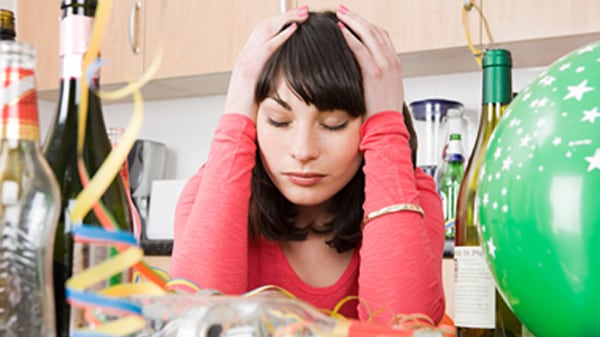In the grand tradition of ringing in the new year in a haze of remorse and nausea, let’s turn to the topic at hand: our hangovers.
For the drinkers among us, hangovers are the great karmic payback. They’re the evil twin of nighttime revelry. Countless “cures” are on offer: Take a Centrum before you go to sleep; guzzle Gatorade; eat a greasy breakfast; hit the sauna; have another drink. Many people have a pet cure they swear by, but there's little evidence for the efficacy of these salves. So drink water and face the facts.
Curing hangovers is a bit like curing jetlag—you can’t get around the problem of time zones. And once you’ve drunk yourself into a state of morning-after misery, there’s no magic fix-it for getting yourself back out.
What exactly is it about consuming massive amounts of alcohol that creates this bodily hell? There are several culprits, but the equation that looms the largest:
“Dehydration plus fatigue equals hangover,” says Dr. Jamshid Ghajar, a neurosurgeon and president of The Brain Trauma Foundation in New York.
Alcohol is a diuretic, which means incessant peeing, and an increased chance of dehydration. The excessive loss of fluids that occurs in a dehydrated state interferes with circulation and makes you feel dizzy, headachy, and weak.

To lessen the blow—alternate cocktails with glasses of water; don’t drink on an empty stomach; drink to maintain a buzz, not to invite a coma.
The fatigue that contributes to hangovers results from the fact that drinking past the point of a good, sensible buzz will prevent the brain from getting a normal night of sleep. Alcohol is a depressant. It numbs the central nervous system, “like anesthesia,” says Dr. Ghajar. “People don’t realize that. They think it’s like cocaine.”
Alcohol’s true sedating nature is disguised by its initial effect: the energized surge that comes from being buzzed.
Because most of the brain’s circuits are inhibitory—meaning that they tamp down brain activity—these circuits are the ones affected by our first couple of drinks. Two or three cocktails into the night and these neural brakes are released—and voila, we experience the disinhibited state known as a buzz.
“You want to reach that middle range of blood alcohol where you get a nice buzz but you’re still awake,” says Ghajar.
Medical students, Ghajar points out, tend to be masters of the “loading dose”—the amount of alcohol needed to get to this stage of buzz, without crossing the threshold into the next state of drunkenness. They learn all about it in pharmacology class.
Unfortunately, the rest of us often march blithely on, continuing to drink at an unhindered pace. And, once the brain’s inhibitory circuits have been relaxed, the alcohol’s effects move to the brain’s excitatory circuits—those neurons involved in keeping us awake, aroused, and alive. When these circuits get doused in alcohol, we start feeling sleepy.
Eventually, we go to bed. Our liver goes to work, metabolizing the booze, ushering it out of our blood stream. Within hours, our alcohol level has gone down, our excitatory brain circuits have rallied, and we’re back to the level of buzzed arousal. This is when we find ourselves wide-awake at four in the morning, sleepless, nauseous, and thinking about every indiscreet remark we made at the party—and whether vomiting is inevitable. In other words, a wonderfully restorative slumber.
By the time we open our eyes the next morning, we’re exhausted, dehydrated, nauseous, our electrolytes are out of whack, and our blood sugar levels have plunged.
We’re a shambles.
And this is exactly why hangovers are so often accompanied by a black mood—a feeling of depression or intense vulnerability, says Dr. Harris Stratyner, clinical associate professor at the Mount Sinai School of Medicine and vice chairman of the National Council on Alcoholism and Drug Dependence's board of directors.
Our mind mirrors our body.
“A hangover plays out psychologically just as much as it does physiologically,” says Stratyner.
But New Years Day is no time to dwell on what could have been done to lessen the blow—alternate cocktails with glasses of water; don’t drink on an empty stomach; drink to maintain a buzz, not to invite a coma.
So let’s not, and say we did.
“I would say to the people who are hung over and depressed: This too shall pass,” says Harris Stratyner.
Happy New Year everyone. At least we’re in this together.






